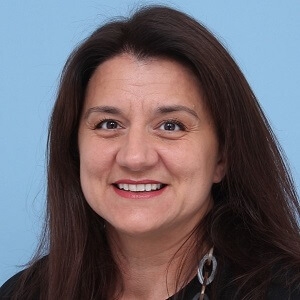The ancillary position of Zina Agovic

31-08-2022 | Author: Angelo van Leemput
Why did you want to become a Board member at the Refugee Talent Hub?
‘It actually has a lot to do with my own personal background. I was a refugee myself after fleeing from Bosnia in 1992, together with my father, mother, and brother. I was 17 years old at the time. We had a nice life in Bosnia and both of my parents had a good job. Until the war broke out that is. After that, everything changed. We managed to escape just in time from Zvornik, where we lived, before events took their course, culminating in a bloodbath a short time later.
In the end, we made our home in the Dutch province of Limburg. Here in the Netherlands, we have had every opportunity. I went to school and studied at university, though that certainly wasn’t easy. My parents, for example, found it rather difficult to find suitable employment. I will never forget how my father trembled with delight when he finally got a job. “Now I can provide for all of you again”, he said. It was an emotional moment. Having a job is such an important part of life.’
What do you see as your main task at the Refugee Talent Hub?
‘I want my work here to focus on helping refugees get back into work. Work is a basic need. Without work, it is almost impossible to get your life back on track. But I do also want to look at the issue from the opposite side of the table as well – employers are jumping at the chance to employ talented recruits who possess certain skills. In many cases, the refugees’ résumés don’t form a perfect match with the vacancies that are out there, which means that a certain amount of effort is needed on both sides. What we do is help convince companies that it is a matter of skills and competencies and not so much about a candidate’s education or résumés. We also help refugees discover other things they can do rather than continue in the profession they had before.’
Have you already had some successes?
‘Yes, I would say so. When I came here one year ago, people were critical about the results we had achieved. They said that the Refugee Talent Hub had helped “only” 80 people back into work. To me, that was a really great result. 80 people! That is fantastic! Especially during the coronavirus pandemic! Nowadays, our target has increased to 200 jobs a year.’
How do you manage to combine your role as a board member with your busy job at Signify?
‘What I actually do is manage them with each other, not alongside each other. For me, a meeting for the Refugee Talent Hub is just as important as a meeting at Signify. All of my meetings form part of my day-to-day activities. What is more, my two roles often complement each other. By working at Signify, I am aware of the skills Dutch companies are looking for and by working at the Refugee Talent Hub, I know what talented people are available in the Netherlands. Recently, I organized a job application training course at Signify, which was a great success. In the meantime, we have received a number of résumés and are looking forward to meeting those talented individuals for ourselves. It really is a win-win situation for all involved!’
What does your position as a Board member bring to you personally?
‘A war like the one taking place right now in Ukraine brings me back to reality with a bump. It makes me think of my own situation back in the 1990s. Now that I have built up a career for myself in the Netherlands, I want to do something in return for the people who urgently need our help now. The fact that I can do something to help them feels like a privilege to me. In English, there is word that nicely describes this – rewarding. That is exactly how it feels.’
Interview by Heiko Mijnarends, consultant at Spencer Stuart. This interview was published in Management Scope 07 2022.
This article was last changed on 31-08-2022
